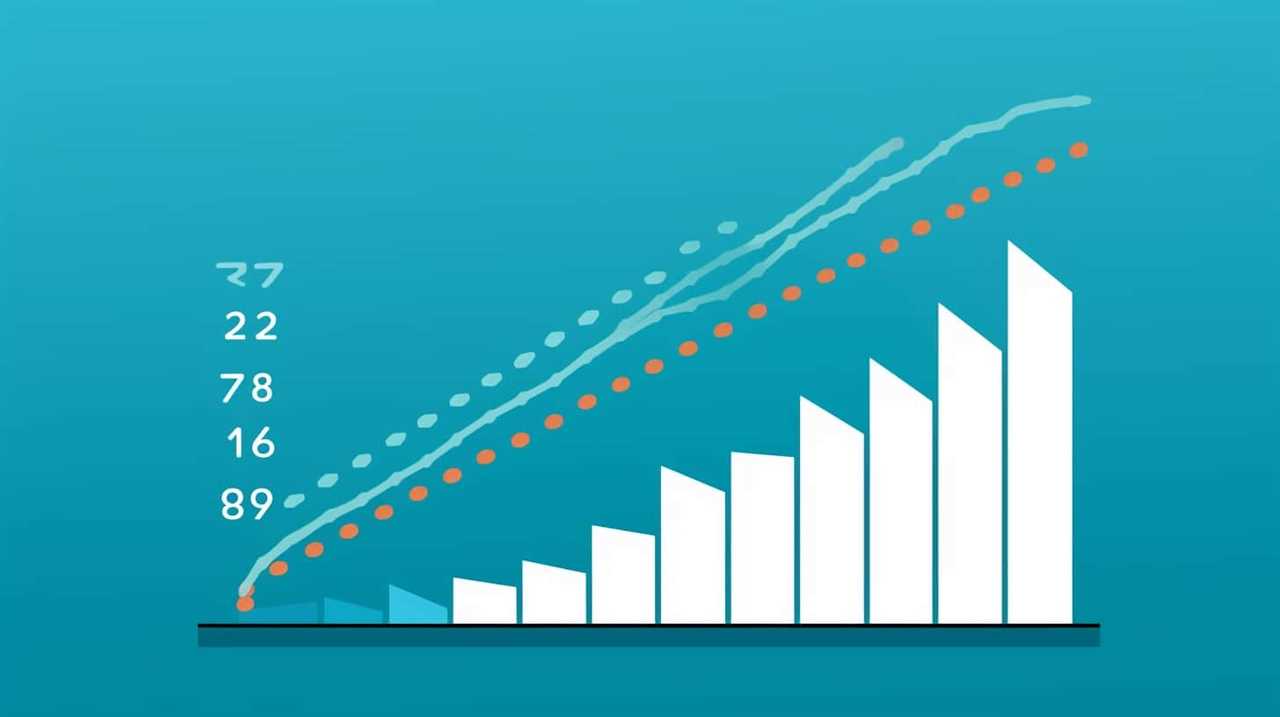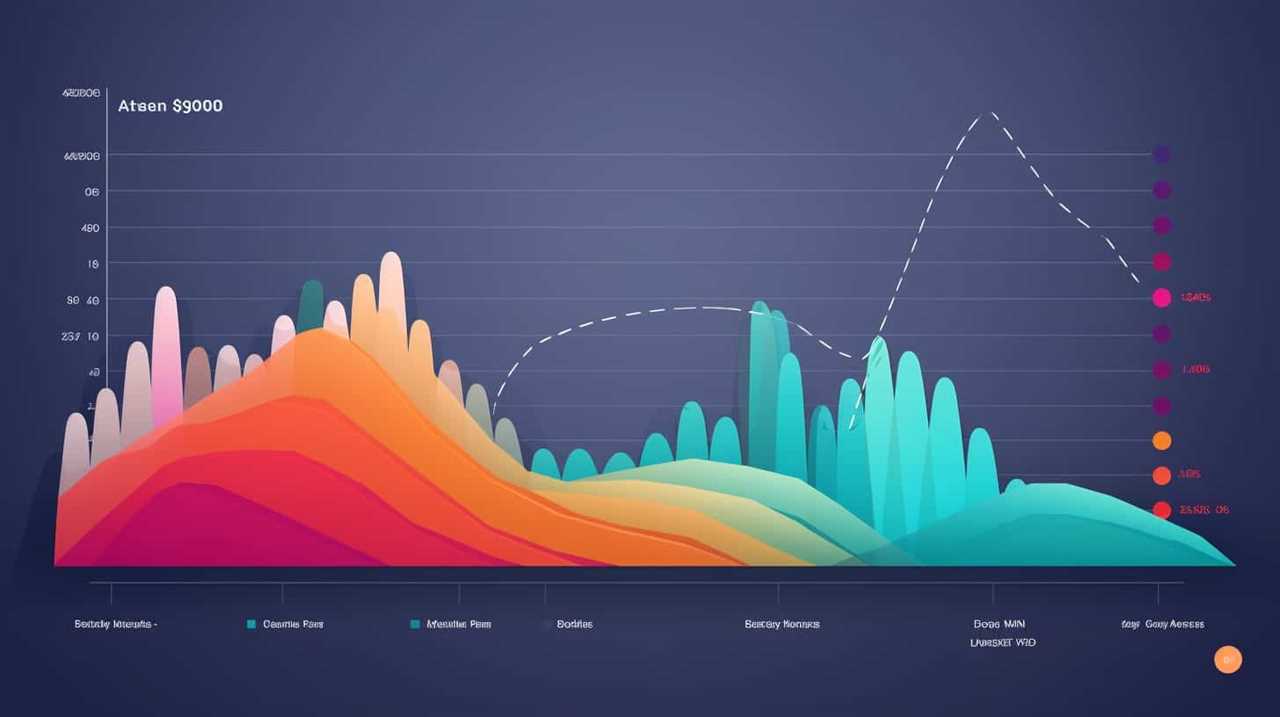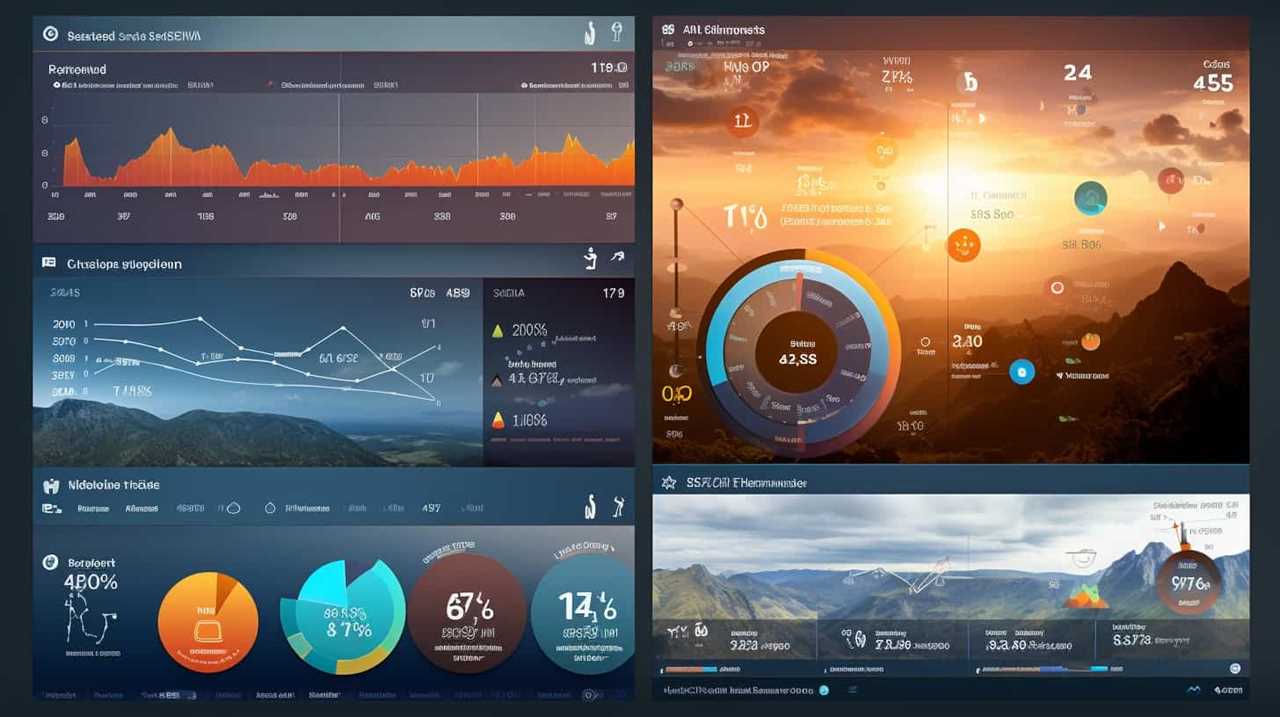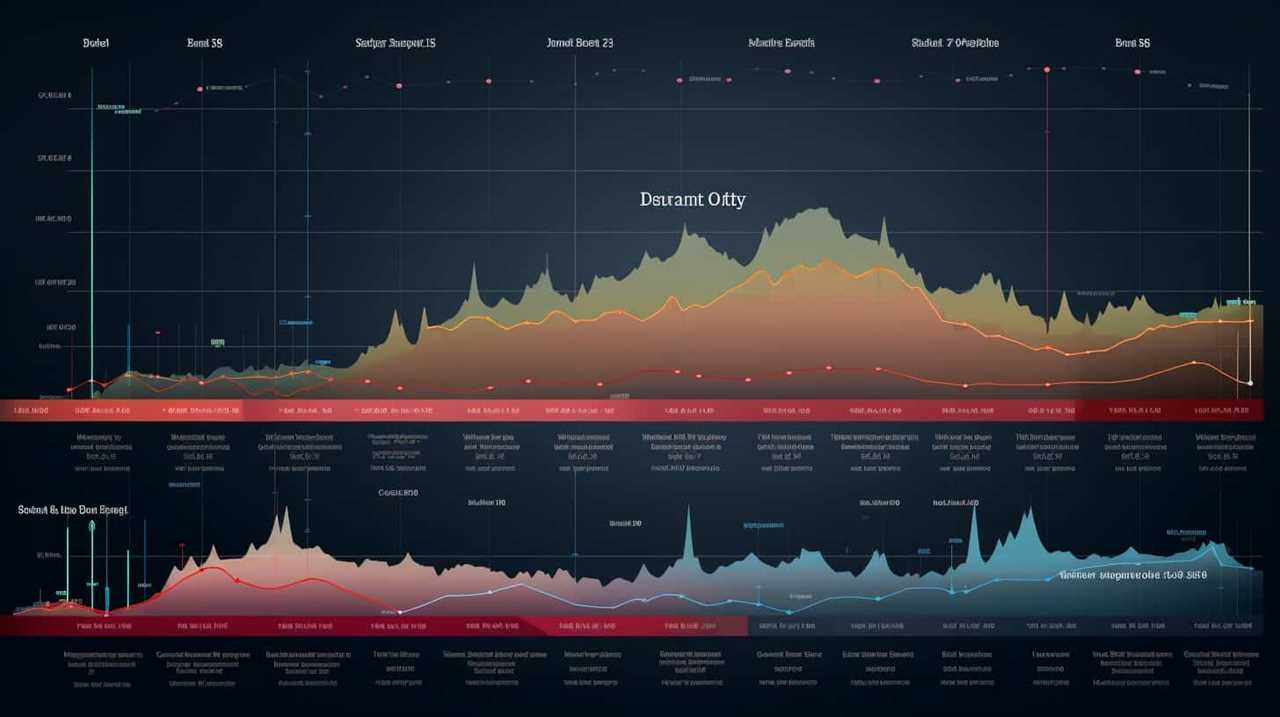Holistic SEO
Local SEO for Restaurants: Serving Up Your Online Presence

Looking for success? We hold the key to boosting your restaurant’s online presence: Local SEO.
Just like a perfectly crafted dish, Local SEO serves up increased visibility and engagement for your restaurant.
From understanding search algorithms to optimizing your website and managing online reviews, this article will guide you through the key ingredients of a successful Local SEO strategy.
Get ready to savor the benefits of a strong online presence and leave your competitors hungry for more.

Key Takeaways
- Local SEO is crucial for restaurants to enhance their online presence and attract the right customers.
- Optimizing website content and online listings with relevant keywords and information improves visibility in local search results.
- Understanding local search algorithms and incorporating relevant keywords and accurate information can significantly impact search rankings.
- Utilizing customer reviews, managing online reputation, and leveraging online directories are essential strategies for successful local SEO for restaurants.
The Importance of Local SEO
In our experience, local SEO plays a crucial role in enhancing the online presence of restaurants. Understanding local search intent is key to attracting the right customers to your establishment. When people search for a restaurant in their area, they’re often looking for specific information, such as menus, opening hours, and reviews. By optimizing your website and online listings with relevant keywords and information, you can ensure that your restaurant appears in these local search results.
But how can you measure the success of your local SEO efforts? One way is to track your website’s organic search rankings for relevant keywords. Are you appearing on the first page of search results? Are you outranking your competitors? Additionally, monitoring your website traffic and user engagement metrics can provide insights into the effectiveness of your local SEO strategies. Are visitors spending time on your site, exploring different pages, and ultimately making reservations or orders?
Understanding Local Search Algorithms
To fully optimize your restaurant’s online presence, we need to dive into the intricacies of local search algorithms and how they impact our visibility to potential customers in the area. Understanding local search algorithms is key to ensuring that your restaurant appears prominently in local search results. These algorithms determine the relevance and ranking of search results based on various factors such as proximity, relevance, and prominence. By optimizing your website content according to these algorithms, you can increase your chances of appearing in the top search results and attracting more customers.
To help you understand the impact of local search algorithms, let’s take a look at the three main factors that influence search ranking:

| Proximity | Relevance | Prominence |
|---|---|---|
| Distance between the user and the restaurant | How well the restaurant matches the user’s search intent | The online reputation and credibility of the restaurant |
Optimizing website content involves incorporating relevant keywords, providing accurate and up-to-date information such as your restaurant’s address, phone number, and opening hours, and ensuring that your website is user-friendly and mobile-responsive. Additionally, actively managing your online reviews and ratings can enhance your restaurant’s prominence and credibility.
Optimizing Your Website for Local Search
When it comes to optimizing our website for local search, there are a few key points we need to consider.
First, we should target local keywords that are relevant to our restaurant and the area we serve. This will help us rank higher in search engine results and attract local customers.
Additionally, it’s important to optimize our Google My Business listing with accurate and up-to-date information, including our address, phone number, and business hours. This will make it easier for potential customers to find us online and visit our restaurant.

Targeting Local Keywords
Our restaurant website is optimized for local search by targeting specific keywords that are relevant to our target audience in the area.
To ensure our website ranks well in local search results, we conduct thorough local keyword research. This involves identifying the keywords and phrases that our potential customers are using when searching for restaurants in our locality.
Once we’ve identified these keywords, we strategically optimize our on-page content to include them in our website’s meta tags, headers, titles, and descriptions. This helps search engines understand the relevance of our website to local search queries.
Optimizing Google My Business
We optimize our website for local search by leveraging Google My Business to enhance our online presence in the area. Google My Business is a powerful tool that allows us to manage our business information and interact with customers on Google Maps and search. By optimizing our Google My Business profile, we can improve our online visibility and attract more local customers.

Here are some key steps to optimize Google My Business:
| Step | Description |
|---|---|
| 1 | Claim and verify our listing |
| 2 | Ensure our business information is accurate and up-to-date |
| 3 | Add high-quality photos and videos |
| 4 | Encourage customers to leave reviews |
| 5 | Respond to customer reviews and messages |
| 6 | Monitor and analyze insights to make data-driven decisions |
Claiming and Optimizing Your Google My Business Listing
When it comes to local SEO for restaurants, claiming and optimizing your Google My Business listing is crucial.
First and foremost, it’s important to verify your listing to ensure that it appears in Google search results.
Additionally, optimizing your business information, such as your address, phone number, and hours of operation, can greatly improve your online visibility.

Lastly, don’t underestimate the power of customer reviews – actively encouraging and responding to reviews can boost your restaurant’s reputation and attract more diners.
Importance of Verification
Verifying your Google My Business listing plays a crucial role in optimizing your online presence as a restaurant. It not only ensures that your information is accurate and up-to-date but also boosts your visibility in local search results.
Here are three reasons why verifying your Google My Business listing is important:
- Enhanced credibility: A verified listing adds credibility to your restaurant’s online presence. It shows that your business is legitimate and trustworthy, which can attract more customers.
- Improved search visibility: Verifying your listing helps Google understand that your restaurant is a legitimate local business, increasing the likelihood of your restaurant appearing in local search results.
- Consistent information across platforms: Verifying your Google My Business listing allows you to ensure that your restaurant’s information is consistent across different platforms. This consistency helps potential customers find accurate and reliable information about your restaurant.
Optimizing Business Information
After successfully verifying our Google My Business listing, we can now focus on optimizing our business information to maximize our online presence as a restaurant. One crucial aspect of optimizing our business information is optimizing our menu. By ensuring that our menu is accurate, up-to-date, and easy to navigate, we can provide a seamless user experience for our customers. Additionally, we should consider local citation building, which involves getting our restaurant listed on relevant online directories and review sites. This helps to establish credibility and improve our visibility in local search results. To summarize, optimizing our menu and engaging in local citation building are essential steps in maximizing our online presence as a restaurant. By paying attention to these aspects, we can attract more customers and enhance our overall success in the digital landscape.

| Optimizing Our Menu | Local Citation Building |
|---|---|
| Ensure accuracy and up-to-dateness | Get listed on relevant online directories |
| Make menu easy to navigate | Establish credibility |
| Highlight specials and promotions | Improve visibility in local search results |
Utilizing Customer Reviews
To optimize our Google My Business listing and make the most of customer reviews, we need to claim and optimize our listing on the platform. Here are three key steps to take:
- Claim and verify your listing:
Start by claiming your listing on Google My Business. This will give you ownership and control over the information displayed. Verify your listing by following the instructions provided by Google. - Encourage customers to leave reviews:
Actively engage with your customers and ask them to leave reviews on your Google My Business listing. Positive reviews not only boost your online reputation but also improve your search engine rankings. - Respond to customer reviews:
Take the time to respond to both positive and negative reviews. Thank customers for their feedback and address any concerns they may have. This shows that you value their opinion and are committed to providing excellent customer service.
Managing Online Reviews and Reputation
Throughout our journey of improving local SEO for restaurants, we have learned the crucial importance of effectively managing online reviews and maintaining a positive reputation. In today’s digital age, online reviews have a significant impact on a restaurant’s success. Customers rely on reviews to make informed decisions about where to dine, and a positive reputation can greatly influence their choice. On the other hand, negative reviews can deter potential customers and harm a restaurant’s image.
To successfully manage online reviews, it is essential to respond promptly and professionally to customer feedback, both positive and negative. By engaging with customers, restaurants can show that they value their opinions and are committed to providing excellent service. This not only improves customer satisfaction but also demonstrates to potential diners that the restaurant is responsive and cares about its patrons.
In order to better understand the impact of online reviews and reputation management, let’s take a look at the following table:

| Positive Reviews | Negative Reviews | Reputation Management Tips | Importance of Managing Online Reviews |
|---|---|---|---|
| Increase customers’ trust | Deter potential customers | Respond promptly and professionally | Influence customers’ decision-making |
| Enhance brand image | Harm restaurant’s image | Address concerns and resolve issues | Maintain a positive reputation |
| Boost local SEO ranking | Lower search visibility | Encourage satisfied customers to leave reviews | Improve online visibility |
Leveraging Online Directories and Review Sites
When it comes to improving our online presence, leveraging online directories and review sites can have a significant impact.
Online directories provide an easy way for potential customers to find us, while review sites allow us to showcase our reputation and build trust.
Benefits of Online Directories
Online directories and review sites provide restaurants with a valuable platform to enhance their visibility and attract potential customers. Here are three benefits of leveraging online directories:
- Increased visibility: By listing your restaurant on popular online directories like Yelp, Google My Business, and TripAdvisor, you increase your chances of being discovered by local customers who are actively searching for dining options in your area.
- Improved local search rankings: Online directories play a significant role in citation building, which refers to the process of getting your restaurant’s name, address, and phone number (NAP) listed consistently across various online platforms. This consistency helps search engines like Google trust the accuracy of your business information, ultimately improving your local search rankings.
- Customer reviews and ratings: Online directories and review sites allow customers to leave feedback and ratings about their dining experience at your restaurant. Positive reviews can help build trust and credibility, attracting more customers, while negative reviews provide an opportunity for you to address issues and improve your services.
Maximizing Review Site Impact
To maximize the impact of review sites and online directories, we focus on optimizing our restaurant’s online presence. One way we do this is by actively managing and responding to customer reviews.

Positive reviews can greatly influence potential customers’ decisions, so it’s important to showcase our restaurant’s strengths and create a positive image. We also take negative reviews seriously and respond promptly and professionally. Addressing concerns and offering solutions can help to mitigate the impact of negative feedback and show that we care about our customers’ satisfaction.
Additionally, we make sure our restaurant is listed on popular review sites and directories to increase our visibility and reach a wider audience. By leveraging online directories and review sites effectively, we can maximize customer satisfaction and build a strong online reputation for our restaurant.
Utilizing Location-Based Keywords
One important strategy for optimizing local SEO for restaurants is by incorporating location-based keywords into our website content. By using these keywords strategically, we can attract more local customers and improve our online visibility.
Here are three ways to effectively utilize location-based keywords:

- Conduct Local Keyword Research: Start by researching the keywords that people in our local area are using when searching for restaurants. Tools like Google Keyword Planner can help us identify popular keywords and phrases specific to our location. This research will guide us in choosing the most relevant keywords to incorporate into our website content.
- Implement Location-Based Targeting: Once we’ve identified the right keywords, we need to strategically place them throughout our website. This includes optimizing our page titles, meta descriptions, headings, and content with location-specific keywords. By doing so, search engines will better understand the geographical relevance of our website and show it to users searching for local restaurants.
- Optimize Google My Business Listing: In addition to our website, we should optimize our Google My Business listing with location-based keywords. This will help potential customers find our restaurant when searching on Google Maps or using voice search.
By incorporating location-based keywords into our website and online presence, we can improve our local SEO and attract more customers in our area.
Now, let’s move on to the next section: creating and promoting local content.
Creating and Promoting Local Content
Let’s dive into how we can create and promote local content to enhance our restaurant’s online presence. Engaging with local bloggers and creating localized social media campaigns are two effective strategies to achieve this goal.
When it comes to engaging with local bloggers, it’s important to reach out and establish relationships with influencers in your area. These bloggers have a dedicated following and can help spread the word about your restaurant to a wider audience. Consider inviting them to your establishment for a complimentary meal or hosting a special event for them to experience your cuisine firsthand. In return, they can write reviews, share their experience on social media, and generate buzz around your restaurant.

Creating localized social media campaigns is another powerful way to connect with your local audience. Tailor your content to reflect the unique aspects of your community. For example, showcase dishes inspired by local ingredients or highlight local events and festivals that your restaurant is participating in. Use hashtags that are specific to your location to increase visibility and engagement. Encourage your followers to share their experiences and tag your restaurant in their posts.
Implementing Schema Markup for Local SEO
Now let’s explore how we can enhance our restaurant’s online presence by implementing schema markup for local SEO. Schema markup implementation is an important aspect of local SEO strategies, as it helps search engines understand the content on your website more effectively.
Here are three key benefits of implementing schema markup for your restaurant’s online presence:
- Improved visibility in search results: Schema markup provides search engines with additional information about your restaurant, such as its location, contact details, and opening hours. This helps search engines display relevant information in search results, making it easier for potential customers to find and connect with your restaurant.
- Enhanced user experience: Schema markup allows you to provide more detailed information about your restaurant’s menu, prices, and customer reviews. This helps users make informed decisions before visiting your establishment, leading to a better overall user experience.
- Increased credibility and trust: By implementing schema markup, you can showcase your restaurant’s accolades, awards, and certifications. This builds credibility and trust among potential customers, highlighting your restaurant as a reputable and trustworthy establishment.
Building Citations and NAP Consistency
To ensure a strong online presence for your restaurant, it’s crucial to focus on building citations and maintaining NAP (Name, Address, Phone number) consistency. Citations are online references to your restaurant’s NAP information on various websites, directories, and social platforms. These citations play a significant role in local SEO, as search engines use them to verify the legitimacy and relevance of your business.

Building citations involves listing your restaurant’s NAP details on reputable platforms such as Google My Business, Yelp, TripAdvisor, and industry-specific directories. It’s essential to ensure the accuracy and consistency of your NAP information across all these platforms. Inconsistent or incorrect NAP details can confuse search engines and potential customers, negatively impacting your online visibility and reputation.
To build citations effectively, start by claiming and optimizing your Google My Business listing. This includes providing accurate and up-to-date NAP information, selecting relevant categories, and uploading high-quality images. Next, focus on popular review sites and directories specific to the restaurant industry. Ensure that your NAP details are consistent across all these platforms.
Maintaining NAP consistency for local SEO requires regularly monitoring and updating your business information. Any changes in your restaurant’s name, address, or phone number should be promptly reflected across all the platforms where your NAP is listed. This consistency helps search engines associate your business with relevant local searches, improving your chances of appearing in local search results.
Monitoring and Analyzing Local SEO Performance
By regularly monitoring and analyzing our restaurant’s local SEO performance, we can gain valuable insights into our online visibility and make informed decisions to improve our rankings.

Here are three key steps to effectively monitor and analyze our local SEO performance:
- Monitoring Rankings: Keeping track of our restaurant’s rankings on search engine results pages (SERPs) is crucial. We can use tools like Google Search Console or third-party tools to monitor our keyword rankings and identify areas for improvement. By regularly checking our rankings, we can determine if our SEO efforts are paying off and adjust our strategies accordingly.
- Tracking Local Competitors: It’s important to keep an eye on our local competitors and understand how they’re performing in search results. By analyzing their SEO strategies, we can identify opportunities to outperform them and gain a competitive advantage. Tools like SEMrush or Moz can help us track our competitors’ rankings, backlinks, and overall online presence.
- Analyzing Website Analytics: Utilizing website analytics tools like Google Analytics can provide valuable data on our website’s performance. We can track metrics such as organic search traffic, bounce rate, and conversion rate to understand how well our SEO efforts are driving traffic and engagement. This information can guide us in making data-driven decisions to optimize our website and improve our local SEO performance.
Engaging With Local Influencers and Partnerships
One key strategy for improving our restaurant’s local SEO performance is to actively engage with local influencers and form partnerships.
Engaging with local influencers can greatly enhance our online presence and increase our visibility within the local community. These influencers have a strong following and their recommendations and endorsements can greatly impact the success of our restaurant.
To begin engaging with local influencers, we should first identify who they are. Look for individuals who’ve a significant social media following and who frequently talk about local restaurants or food-related topics. Reach out to them and offer them a complimentary meal or special experience at our restaurant in exchange for a review or social media post. By doing so, we can tap into their audience and gain exposure to potential new customers.

In addition to engaging with influencers, forming strategic partnerships with other local businesses can also be beneficial for our local SEO. Collaborating with complementary businesses, such as local food bloggers, event organizers, or even nearby hotels, can help us cross-promote each other and reach a wider audience. By working together, we can leverage each other’s networks and drive more traffic to our restaurant.
Keeping up With Local SEO Best Practices
As we strive to enhance our restaurant’s local SEO performance, it’s crucial for us to stay updated on the latest best practices in order to maintain our online presence. Here are three key strategies to help us keep up with local SEO best practices:
- Regularly track local SEO performance:
Monitoring our restaurant’s local SEO performance is essential to understand how our online presence is impacting our visibility and ranking. By using tools like Google Analytics and Google Search Console, we can track important metrics such as organic search traffic, keyword rankings, and user engagement. This data will provide valuable insights into the effectiveness of our local SEO efforts and help us identify areas that need improvement. - Optimize our website for local search:
To improve our local SEO, we need to optimize our website for relevant local keywords. This includes incorporating location-specific keywords in our content, meta tags, and URLs. We should also ensure that our website is mobile-friendly and has a fast loading speed, as these factors play a significant role in local search rankings. - Leverage online directories and review platforms:
Having a strong presence on popular online directories and review platforms like Google My Business, Yelp, and TripAdvisor is crucial for local SEO success. We should claim and optimize our business listings on these platforms, ensuring that our NAP (Name, Address, Phone number) information is accurate and consistent across all platforms. Encouraging customers to leave positive reviews will also boost our online reputation and improve our local search rankings.
Conclusion
In conclusion, local SEO is an essential ingredient for restaurants to thrive in the online world. By understanding and optimizing your website for local search, claiming your Google My Business listing, managing online reviews, and building citations, you can increase your online presence and attract more customers.
Remember to monitor and analyze your local SEO performance regularly and engage with local influencers and partnerships. By keeping up with the ever-evolving best practices, you can stay ahead of the game and serve up a successful online presence.

So let’s spice up our local SEO game and sizzle our way to success!
Holistic SEO
Guide to Holistic SEO for Optimal Website Performance

Welcome to our detailed guide on Complete SEO for maximizing website performance.
Are you ready to master the art of driving organic traffic and improving your online presence?
In this article, we will delve into the importance of holistic SEO and provide you with practical on-page optimization techniques, off-page optimization strategies, and technical SEO best practices.
We will also explore how to measure and analyze your website’s performance to ensure continuous growth.
Get ready to take your website to the next level!
Key Takeaways
- User experience is crucial for website performance, leading to longer stay and higher conversion rates.
- Integrating social media enhances holistic SEO strategy, increasing audience engagement, brand awareness, and traffic.
- On-page optimization techniques, such as keyword research and content optimization, improve website visibility and ranking on search engine result pages (SERPs).
- Off-page optimization strategies, including guest blogging and backlink building, enhance website visibility and organic traffic.
Importance of Holistic SEO
In our experience, holistic SEO is vital for achieving optimal website performance. The role of user experience in holistic SEO can’t be overstated. When users have a positive experience on your website, they’re more likely to stay longer, explore further, and ultimately convert into customers. This is why it’s important to focus on elements such as page load speed, mobile responsiveness, and intuitive navigation.
Additionally, integrating social media into your holistic SEO strategy can have numerous benefits. Social media platforms provide an opportunity to engage with your audience, build brand awareness, and drive traffic to your website. By sharing valuable content and encouraging social sharing, you can increase your online visibility and attract more organic traffic.
As we transition into the subsequent section about on-page optimization techniques, it’s important to remember that a holistic SEO approach considers all aspects of your website to ensure maximum performance.
On-Page Optimization Techniques
To optimize your website’s performance, we’ll now delve into the subtopic of on-page optimization techniques. On-page optimization plays a crucial role in improving your website’s visibility and ranking on search engine result pages (SERPs).
Two key components of on-page optimization are keyword research and content optimization.
Keyword research involves identifying the most relevant and high-performing keywords that align with your website’s content and target audience. By conducting comprehensive keyword research, you can optimize your website’s content to increase its chances of ranking higher in search engine results.
Content optimization focuses on optimizing the various elements on your web pages, such as headings, meta tags, URLs, and image alt text, to make them more search engine friendly. This includes incorporating target keywords strategically throughout your content and ensuring it’s relevant, engaging, and well-structured.
Off-Page Optimization Strategies
We will now explore the effectiveness of incorporating off-page optimization strategies into our holistic SEO approach. Off-page optimization refers to the techniques used outside of our website to improve search engine rankings.
Two key strategies for off-page optimization are guest blogging and backlink building.
Guest blogging involves writing and publishing content on other websites within our industry. This allows us to showcase our expertise, reach a wider audience, and build valuable backlinks to our website.
Backlink building is the process of acquiring links from other websites that point back to our own. These links act as votes of confidence and authority, signaling to search engines that our website is trustworthy and relevant.
By implementing these off-page optimization strategies, we can enhance our website’s visibility, increase organic traffic, and improve search engine rankings.
It’s essential to have a well-rounded SEO approach that includes both on-page and off-page optimization techniques to achieve optimal website performance.
Technical SEO Best Practices
Continuing our exploration of effective off-page optimization strategies, let’s now delve into the realm of technical SEO best practices.
When it comes to optimizing your website for search engines, conducting an SEO audit is crucial. An SEO audit checklist can help ensure that all technical aspects of your website are in order. It involves assessing factors such as website speed, mobile-friendliness, URL structure, and metadata optimization.

Another important aspect of technical SEO is keyword research. By utilizing keyword research techniques, you can identify the most relevant and high-performing keywords to target on your website. This will help improve your website’s visibility and drive organic traffic.
Technical SEO plays a vital role in optimizing your website’s performance and ensuring that it’s easily discoverable by search engines.
Measuring and Analyzing Website Performance
As we delve into the realm of measuring and analyzing website performance, let’s explore the importance of utilizing data-driven insights to optimize our website for optimal results.
Website analytics play a crucial role in understanding how our website is performing and identifying areas for improvement. By analyzing metrics such as traffic sources, page views, bounce rate, and conversion rate, we can gain valuable insights into user behavior and preferences.
These insights allow us to make informed decisions about our website’s design, content, and marketing strategies. Monitoring conversion rate is especially important as it directly impacts our website’s effectiveness in achieving its goals, whether it’s generating leads, making sales, or increasing engagement.
Frequently Asked Questions
How Long Does It Take to See Results From Holistic SEO Efforts?
On average, it takes time to see results from holistic SEO efforts. Success is measured by tracking website performance over time. This guide provides insights on optimizing SEO for optimal website performance.
Can I Implement Holistic SEO Strategies on My Own, or Do I Need to Hire an SEO Agency?
Implementing holistic SEO strategies on your own or hiring an agency? Weigh the pros and cons. DIY can save money but requires time and expertise. Hiring an agency provides expertise but can be costly. Measure success through improved website performance.
What Are Some Common Mistakes to Avoid When Implementing Holistic Seo?
When implementing holistic SEO, it’s important to avoid common mistakes to ensure optimal website performance. By understanding the benefits of holistic SEO in e-commerce websites, we can achieve mastery in our SEO strategies.
Are There Any Specific Industries or Types of Websites That Can Benefit the Most From Holistic Seo?
In our experience, specific industries or types of websites that can benefit the most from holistic SEO include e-commerce, healthcare, and local businesses. Key factors to consider for successful implementation are keyword research, content optimization, and technical SEO.
How Does Holistic SEO Differ From Traditional SEO Practices?
Holistic SEO differs from traditional SEO practices in its focus on long-term success and a comprehensive approach. It emphasizes the benefits of optimizing all aspects of a website, including content, user experience, and technical elements, for optimal performance and search engine visibility.
What Are the Key Strategies to Achieve Full-Scale Website Optimization with Holistic SEO?
Implementing holistic seo website optimization requires a combination of key strategies. Firstly, conducting comprehensive keyword research to understand user intent is crucial. Next, optimizing on-page elements such as meta tags, headers, and content structure ensure search engines understand your website fully. Additionally, creating unique and valuable content, optimizing site speed, and prioritizing mobile responsiveness contribute to a holistic SEO approach. Building quality backlinks and monitoring analytics regularly further refine optimization efforts.
Conclusion
In conclusion, implementing holistic SEO is essential for achieving optimal website performance. By focusing on both on-page and off-page optimization techniques, as well as technical SEO best practices, you can boost your website’s visibility and organic traffic.
It’s like tending to a well-maintained garden, where each aspect contributes to the overall beauty and health of the plants. By measuring and analyzing website performance, you can continuously improve and refine your SEO strategy, ensuring long-term success.

Holistic SEO
Mastering Holistic SEO for Full-Scale Website Optimization

Are you prepared to master comprehensive SEO in order to improve your entire website? We are here to help you.
In this article, we’ll guide you through the fundamentals of holistic SEO, from keyword research and analysis to on-page and off-page optimization techniques.
We’ll also show you how to measure and analyze SEO performance to ensure maximum results.
Get ready to take your website to the next level and achieve true mastery in the world of SEO.
Let’s dive in.
Key Takeaways
- Content marketing strategies attract and engage the target audience.
- Thorough keyword research uncovers valuable keywords.
- User experience optimization enhances engagement and conversions.
- Mastering keyword research maximizes online visibility.
The Fundamentals of Holistic SEO
When implementing holistic SEO strategies, we prioritize understanding the fundamentals of optimizing a website for full-scale performance. One of the key aspects of holistic SEO is content marketing strategies. By creating valuable and relevant content, we can attract and engage our target audience while also improving our website’s visibility in search engine results. This involves conducting thorough keyword research, crafting compelling headlines, and optimizing our content with relevant keywords and meta tags.
Another fundamental aspect of holistic SEO is user experience optimization. It’s crucial to ensure that our website provides a seamless and enjoyable experience for users. This includes optimizing website speed, improving navigation and site structure, and making our content easily accessible and readable. By prioritizing user experience, we can enhance engagement, increase conversions, and improve overall website performance.
Keyword Research and Analysis
To continue our discussion on holistic SEO, let’s delve into the importance of keyword research and analysis for optimizing a website’s performance.
Keyword research is a critical step in understanding the search behavior of your target audience and identifying the most relevant and valuable keywords to target.
Here are four key reasons why keyword research and analysis are crucial for website optimization:
- Identify high-value keywords: By conducting competitive analysis and researching industry trends, you can uncover valuable keywords that have high search volume and low competition.
- Discover long tail keywords: Long tail keywords are more specific and less competitive, allowing you to target niche audiences and drive targeted traffic to your website.
- Optimize content: Keyword research helps you optimize your website content by strategically incorporating relevant keywords into your titles, headings, meta tags, and body content.
- Stay ahead of the competition: By continuously analyzing keywords and monitoring your competitors’ keyword strategies, you can stay ahead in the search rankings and attract more organic traffic.
Mastering keyword research and analysis is essential for achieving full-scale website optimization and maximizing your online visibility.
On-Page Optimization Techniques
Now let’s explore On-Page Optimization Techniques, which play a crucial role in enhancing a website’s performance and visibility.
On-page optimization focuses on optimizing individual web pages to improve their search engine rankings and attract more organic traffic. One key aspect of on-page optimization is content optimization, which involves creating high-quality, relevant, and keyword-rich content that resonates with your target audience.
This includes using appropriate headings, subheadings, and incorporating relevant keywords naturally throughout the content. Another important on-page optimization technique is optimizing meta tags, such as title tags and meta descriptions.
These tags provide a concise summary of the page’s content and help search engines understand what the page is about. By optimizing these elements, you can increase the chances of your website ranking higher in search engine results.
In the next section, we’ll delve into off-page optimization strategies to further enhance your website’s visibility and authority.
Off-Page Optimization Strategies
Continuing from the previous subtopic, we can explore off-page optimization strategies to further enhance our website’s visibility and authority. Off-page optimization focuses on improving our website’s reputation and credibility through external factors. Here are four key strategies to consider:
- Link Building: Building high-quality backlinks from reputable websites can significantly improve our website’s search engine rankings. It’s important to focus on acquiring natural and relevant links that demonstrate our authority and expertise in our industry.
- Social Media Presence: Having an active and engaging presence on social media platforms can help increase brand awareness, drive traffic to our website, and improve search engine visibility. It’s crucial to create valuable content and engage with our audience to build a strong online community.
- Guest Blogging: Collaborating with influential bloggers or industry experts to publish guest posts on their websites can help us reach a wider audience and gain valuable backlinks. It’s essential to choose relevant and reputable websites that align with our niche.
- Online Reputation Management: Monitoring and managing our online reputation is crucial for building trust and credibility. Responding to customer reviews, addressing negative feedback, and actively managing our brand image can positively impact our website’s visibility and authority.
By implementing these off-page optimization strategies, we can enhance our website’s visibility, credibility, and ultimately improve our overall SEO performance.
In the next section, we’ll explore the importance of measuring and analyzing SEO performance to ensure continuous improvement.
Measuring and Analyzing SEO Performance
Measuring and analyzing SEO performance is essential for evaluating the effectiveness of our optimization efforts and identifying areas for improvement. Without proper tracking and analysis of SEO data, we would be blindly implementing strategies without knowing whether they are yielding the desired results. By monitoring key metrics such as organic traffic, keyword rankings, and conversion rates, we can gain valuable insights into the performance of our website and make informed decisions to drive better results.
In addition to tracking our own SEO performance, competitor analysis is also crucial for staying ahead in the game. By analyzing the SEO strategies of our competitors, we can identify opportunities and uncover areas where we can outperform them. This involves evaluating their keyword rankings, backlink profiles, and content strategies to gain a competitive edge.
To help visualize the importance of measuring and analyzing SEO performance, here is a table showcasing some key metrics and their significance:
| Metric | Significance |
|---|---|
| Organic Traffic | Indicates the amount of traffic generated through search engines, reflecting the reach of our website. |
| Keyword Rankings | Shows how well our website ranks for targeted keywords, indicating visibility and competitiveness. |
| Conversion Rates | Measures the percentage of visitors who take desired actions, providing insights into website effectiveness. |
Frequently Asked Questions
What Is the Impact of Holistic SEO on Website Loading Speed?
The impact of holistic SEO on website loading speed is significant. By optimizing various elements such as code, images, and server response time, holistic SEO improves website performance, resulting in faster loading times and better rankings.
How Can I Optimize My Website for Voice Search Using Holistic SEO Techniques?
To optimize our website for voice search, we employ holistic SEO techniques. By focusing on keyword research, mobile optimization, and natural language content, we ensure our site is primed for voice search queries.
Are There Any Specific SEO Techniques for Optimizing Mobile Websites?
Yes, there are specific SEO techniques for optimizing mobile websites. A mobile first approach and responsive design are crucial. By prioritizing mobile users and ensuring a seamless experience, you can improve search rankings and overall website performance.
Can You Provide Examples of Successful Holistic SEO Strategies Implemented by Major Brands?
Successful holistic SEO strategies implemented by major brands showcase the importance of website loading speed. These brands prioritize optimization techniques such as mobile responsiveness, quality content creation, backlink building, and user experience enhancement.
How Does Holistic SEO Contribute to Improving User Experience on a Website?
Improving website usability and enhancing content relevance are key aspects of holistic SEO. By optimizing user experience, we ensure that visitors find what they need quickly and easily, increasing engagement and conversions.
What is the Difference Between Comprehensive SEO and Holistic SEO?
When it comes to digital marketing strategies, understanding the difference between comprehensive SEO and holistic SEO is crucial. While comprehensive SEO focuses on optimizing specific elements of a website to improve its search engine rankings, holistic SEO takes a broader approach and encompasses all aspects of an online presence, including content marketing. By integrating comprehensive seo in content marketing efforts, businesses can ensure their strategies align with search engine algorithms and reach a wider audience.
Conclusion
In conclusion, mastering holistic SEO is the ultimate key to unlocking full-scale website optimization. By seamlessly integrating keyword research, on-page optimization techniques, and off-page optimization strategies, we can achieve remarkable results in our SEO performance.

With a keen eye for analyzing and measuring our efforts, we can strategically optimize our website to attract maximum organic traffic and dominate the digital landscape.
Don’t settle for mediocre SEO, go all-in with holistic optimization and watch your website soar to new heights.
Holistic SEO
Impact of Social Media on Holistic SEO Practices

In the digital world, social media plays a crucial role in comprehensive SEO strategies. It helps enhance visibility, build brand awareness, and boost user engagement.
With its power to amplify content and strengthen online reputation, social media acts as a beacon, guiding our website towards higher search engine rankings and organic reach.
As we embark on this journey, let us delve into the symbiotic relationship between social media and holistic SEO, unveiling the impact it holds for our mastery in the digital realm.
Key Takeaways
- Social media platforms can be effectively utilized to increase visibility and brand awareness.
- Collaborating with influencers can boost brand visibility and reach a wider audience.
- Analyzing social media analytics helps to understand user behavior and optimize website traffic.
- Leveraging social media strategies can enhance SEO practices and improve search engine rankings.
Increased Visibility and Brand Awareness
To increase visibility and brand awareness, it’s essential that we utilize social media platforms effectively.
Social media advertising and influencer marketing play a crucial role in achieving these goals. By running targeted ad campaigns on platforms like Facebook, Instagram, and Twitter, we can reach a wider audience and increase our brand’s exposure. These platforms offer advanced targeting options, allowing us to reach specific demographics based on factors like age, location, and interests.
Additionally, collaborating with influencers who’ve a large and engaged following can significantly boost our brand’s visibility. Influencer marketing allows us to tap into the trust and influence that these individuals have built with their audience. By aligning our brand with influencers that resonate with our target market, we can increase awareness and credibility, leading to a higher likelihood of conversions and customer loyalty.
Improved Website Traffic and User Engagement
As we continue exploring the impact of social media on holistic SEO practices, it’s important to note how it contributes to improved website traffic and user engagement.
Social media analytics play a crucial role in understanding user behavior and preferences, allowing us to optimize our website to drive more targeted traffic. By analyzing data from social media platforms, we can identify the type of content that resonates with our target audience and tailor our SEO strategies accordingly.
Furthermore, influencer partnerships can significantly boost website traffic and user engagement. Collaborating with influencers who have a large following and influence in our industry can help us reach a wider audience and increase brand visibility. These partnerships can lead to higher engagement rates, increased website visits, and ultimately, improved search engine rankings.
With these tactics in place, we can ensure that our website receives higher traffic and engages users effectively. This sets the stage for the subsequent section on enhanced content distribution and amplification.
Enhanced Content Distribution and Amplification
We optimize our content distribution and amplify our reach through social media channels. By strategically targeting our outreach efforts and forming influencer partnerships, we ensure that our content reaches the right audience and receives maximum exposure. Through targeted outreach, we identify and engage with individuals and communities who are most likely to be interested in our content. This helps us connect with our target audience on a deeper level, fostering stronger relationships and driving higher engagement. Additionally, by partnering with influencers who have a strong following and influence in our niche, we are able to leverage their reach and credibility to amplify the distribution of our content. This results in increased visibility, brand awareness, and ultimately, higher conversions.
| Targeted Outreach | Influencer Partnerships |
|---|---|
| Identify relevant individuals and communities | Collaborate with influencers in our niche |
| Engage with target audience on a deeper level | Leverage their reach and credibility |
| Foster stronger relationships | Amplify distribution of content |
| Drive higher engagement | Increase visibility and brand awareness |
Strengthened Online Reputation and Credibility
Our strong online reputation and credibility are key assets in building trust with our audience. In today’s digital age, where information is readily available and opinions can spread quickly, it’s essential to manage our online credibility effectively. Reputation management plays a vital role in establishing and maintaining a positive image for our brand.
Here are four reasons why a strengthened online reputation is crucial:
- Increased trust: When our audience sees positive reviews, testimonials, and recommendations from others, it enhances their trust in our brand and establishes us as a credible source.
- Improved brand perception: A strong online reputation helps shape how our audience perceives our brand. Positive feedback and interactions can contribute to a positive brand image.
- Enhanced customer loyalty: When customers trust our brand, they’re more likely to stay loyal and recommend our products or services to others.
- Competitive advantage: In a crowded online marketplace, a strong online reputation sets us apart from our competitors. It gives us an edge and attracts potential customers who value credibility and reliability.
Boosted Search Engine Rankings and Organic Reach
Through the integration of social media, we can achieve higher search engine rankings and expand our organic reach. Social media advertising and influencer partnerships play a crucial role in boosting our website’s visibility and driving organic traffic.
Social media advertising allows us to target specific demographics and promote our content to a wider audience. By leveraging the advanced targeting options provided by social media platforms, we can reach users who are more likely to engage with our website and increase our chances of ranking higher in search engine results.
In addition, influencer partnerships enable us to tap into the existing follower base of popular influencers. By collaborating with influencers who align with our brand values, we can leverage their influence to reach a larger audience and drive more organic traffic to our website. This increased visibility can lead to higher search engine rankings, as search engines often prioritize websites with higher organic traffic.
Frequently Asked Questions
How Can Social Media Impact the Overall Visibility and Brand Awareness of a Business?
Social media’s impact on brand perception and leveraging social media influencers for business growth are key factors in increasing overall visibility and brand awareness. These strategies are essential for holistic SEO practices.
What Strategies Can Be Implemented to Improve Website Traffic and User Engagement Through Social Media Platforms?
To improve website traffic and user engagement through social media platforms, we can implement strategies such as website optimization and social media advertising. These tactics can increase visibility and attract more visitors to our site.
How Does Social Media Contribute to Enhanced Content Distribution and Amplification?
Social media reach is crucial for content amplification. It helps in enhancing content distribution by reaching a wider audience, increasing visibility, and driving traffic to websites. Social media’s impact on content amplification cannot be underestimated.
What Are Some Effective Ways to Strengthen Online Reputation and Credibility Using Social Media?
To build trust and establish authority using social media, we focus on strategies like consistently sharing valuable content, engaging with our audience, and showcasing positive customer testimonials. These tactics enhance our online reputation and credibility.
Can Social Media Efforts Alone Boost Search Engine Rankings and Organic Reach, or Should They Be Combined With Other SEO Practices?
Social media efforts alone may not boost search engine rankings and organic reach. Combining them with other SEO practices is crucial. Integration between social media and SEO is necessary for effective results. Social media analytics and measurement play a significant role in achieving mastery.
What Are the Key Ways That Social Media Influences Holistic SEO?
Social media’s impact on holistic seo is substantial. Firstly, it enhances website visibility by allowing businesses to share content and engage with their audience. Secondly, social signals from platforms like Facebook and Twitter contribute to search engines’ ranking algorithms. Lastly, social media drives organic traffic, which increases the likelihood of gaining quality backlinks. Overall, integrating social media into SEO strategy is essential for online success.
Conclusion
In conclusion, the impact of social media on holistic SEO practices is undeniable.
By leveraging social media platforms, businesses can increase their visibility and brand awareness, drive more website traffic and user engagement, distribute and amplify their content, and strengthen their online reputation and credibility.
This ultimately leads to boosted search engine rankings and organic reach.
Social media is like a powerful engine, propelling businesses towards their SEO goals with speed and efficiency.
-

 Expert Content Authority3 months ago
Expert Content Authority3 months agoThe Pillar of SEO: Why Content Consistency Matters Most
-

 Learning Center3 months ago
Learning Center3 months agoUncover How To Use ChatGPT to Write Effective Ad Copy
-

 Learning Center3 months ago
Learning Center3 months agoAI in 2024: 10 Things We are NOT Looking Forward To
-

 Holistic SEO1 hour ago
Holistic SEO1 hour agoHolistic Local SEO Tactics for Small Businesses
-

 Learning Center3 months ago
Learning Center3 months agoOptimize Your Digital Experience with Akamai CDN
-

 Learning Center3 months ago
Learning Center3 months agoUnbiased RankerX Review: A Deep Dive into Its SEO Capabilities
-

 Holistic SEO3 months ago
Holistic SEO3 months agoMoney Robot Review [2024]
-

 Learning Center3 months ago
Learning Center3 months agoExperience How GPT-4 Turbo Beats Claude 2: A Review

















